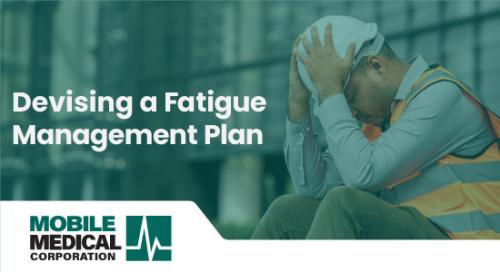If you've ever dragged yourself out of bed on a Monday morning, chances are you're familiar with fatigue. Even the most energized and hard-working people feel it on occasion. While it's a common sensation to many, there comes a point where it stops being a minor annoyance and becomes a major hindrance — both in the workplace and your life. A fatigue management plan is designed to prevent burnout while maximizing employee productivity and safety.
What is Fatigue?
Fatigue is a constant feeling of tiredness or weakness that can be physical, mental, or both. While it's often used to describe simply being tired, fatigue runs deeper than a night of missed sleep. Fatigue can lead to a wide range of increasingly severe symptoms. Physical symptoms can include tiredness, dizziness, sore or weak muscles, headaches, and blurry vision; mental symptoms, meanwhile, include moodiness, slowed response time, impaired judgment, lack of focus or motivation, and even hallucinations.
Causes
While fatigue can lead to the symptoms listed above, it's also a symptom itself. Fatigue can be caused by a wide array of issues, including:
Lifestyle
A poor lifestyle is a common source of fatigue. This can include sleeping too much or too little, having your sleep interrupted by outside forces, indulging in drugs and alcohol, a lack of exercise, or a poor diet.
Negative Emotions
Stubbing your toe or spilling your coffee won't induce fatigue, but constant stress or severe grief can. Extreme or constant negative emotions will leave you feeling tired, unmotivated, and irritable — classic symptoms of fatigue.
Medical Issues
Many medical conditions—such as anemia, diabetes, cancer, and sleep apnea—can leave you feeling fatigued. While you shouldn't fear for your life the second fatigue sets in, it can be an indicator that there's more wrong than a poor sleep schedule. Fatigue is a common symptom of many mental illnesses as well, such as depression or anxiety disorder.
Workplace
Unsurprisingly, a stressful work environment can be a major contributor to feeling fatigued. Everyone's workplace preferences are different, but long hours, understaffing, or a poor social environment often make work much more stressful.
How Does Fatigue Impact Workers?
Fatigue can come from many places, and can make it difficult to perform even small, day to day tasks. The real danger of fatigue, however, is how it affects a person's ability to work.
First of all, a fatigued worker will rarely be as productive as an unfatigued worker. Lack of motivation, slowed reaction times, and inability to focus all sap worker productivity. In fact, fatigued workers are estimated to cost employers between $1,200 - $3,100 per employee annually.
Fatigue doesn't just affect employee productivity, either — it also affects their safety. Severe fatigue affects a person's balance, motor skills, memory, concentration, and decision making. This is particularly problematic in dangerous work environments, such as industrial locations. As a result, fatigue is responsible for about 13% of workplace accidents and injuries each year.
Building Your Fatigue Management Strategy
Because there are multiple causes, managing fatigue can be difficult, especially if it's being caused by an underlying medical issue. However, there are ways to narrow down potential causes before booking a doctor's appointment. Here are several tips for your personal fatigue management plan:
Fix Sleep Schedule
Getting too little or too much sleep, or sleeping at irregular, inconsistent hours, can contribute to overall fatigue. To correct this, try to get eight hours of sleep every night at roughly the same time. Naps can be useful for making up lost sleep, but cut down on them if they're affecting your sleep schedule.
Improve Your Diet
A poor diet can also make you fatigued. Sugary or nutritionally poor foods only provide you with a momentary energy boost, leaving you drained afterwards. Make sure you're eating a well-balanced diet and getting the necessary amount of vitamins. Remember to stay hydrated as well.
Exercise When Possible
Exercise may seem counterproductive to making you less fatigued, but it's actually the opposite. Physical activity boosts your health, mood, and energy levels, which can help you feel less fatigued. While not everyone can maintain the same levels of activity due to schedule, endurance levels, and physical handicaps, it's still important to exercise where possible. This can include something as simple as taking the stairs instead of the elevator, walking to nearby places instead of driving, or dancing to your favorite song.
Adjust Work/Life Balance
This step can be difficult, as it's partially at the discretion of your employer and your personal financial situation. However, if possible, try to manage your work/life balance so you have some time to yourself to rest and recuperate.
If you're an employer, do your best to keep your business properly staffed and manage employee schedules so that individual employees don't bear an unfair amount of the workload. It may be beneficial to implement a fatigue management policy to ensure workers are getting adequate recovery time between shifts.
Attend Counseling
If your fatigue is caused by severe negative emotions, such as grief, you may benefit from counseling. This will provide you with a judgment-free environment to work through negative emotions in a healthy manner, and can help you develop methods of dealing with stress, sadness, and anger.
Cut Out Drugs and Alcohol
A glass of wine or a single cigarette isn't enough to induce chronic fatigue (although you should avoid cigarettes for the sake of your lungs, teeth, and overall health regardless); however, constant drinking or drug use can. Avoid smoking, drinking, and even caffeinated beverages where possible — remember that caffeine is a drug as well, and as a stimulant, it can disrupt your sleep schedule.
See a Doctor
If you've completed the above steps and you're still too fatigued to function, it may be time to schedule an appointment with your doctor. It's possible that the fatigue is a sign of an underlying health issue, one that may become more severe without treatment.
Fight Fatigue with MMC
If your employees are struggling to manage fatigue, Mobile Medical Corp. has you covered. In addition to our on-site medical services, we also offer a wide range of employee health and wellness initiatives, including, behavioral health services, Mental Health First Aid Training, wellness coaching, and counseling services. Don't let your employees flounder through fatigue — contact MMC today and see how we can breathe life back into your workforce.




